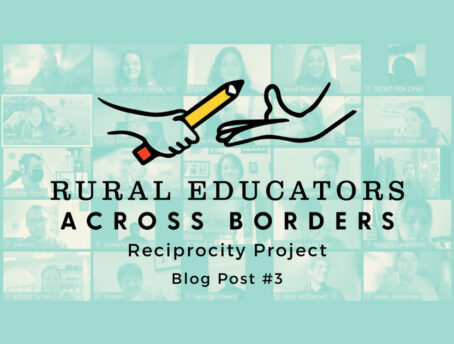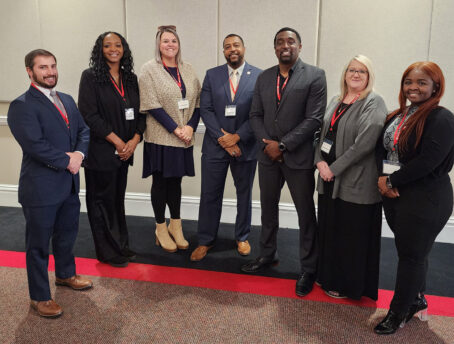Welcome to our second episode of the I Am a Rural Teacher Podcast! This week we're talking with Melissa Wyman, a high school English teacher in Hartford, Vermont. You can listen to the podcast here, or read the story below.
You can also find our podcast on Apple Podcasts, Stitcher, Google Podcasts and Spotify. New episodes will be released every Monday.
For Melissa Wyman, teaching isn't only a passion- it was almost hereditary.
"I'm a third generation educator. My father is a teacher, my aunts and uncles were teachers. My grandmother was a teacher. She was one of the first female administrators in the state of Vermont. My sister and I are both teachers. Like we did not fall far from the tree at all. Like we are the same tree."
Melissa was born and bred in New England. After growing up on Lake Winnipesaukee in New Hampshire, she went to college at the University of Vermont in Burlington and eventually made her way down to White River Junction, a village within the town of Hartford, Vermont. And she’s been teaching at Hartford High School for 10 years now.
Her school is in the Upper Valley region of Vermont. It's right on the Connecticut river, as close as you can get to New Hampshire before spilling into it.
To the average passerby, White River Junction can seem pretty rural. “Downtown” is basically one street full of shops, mountains line the highway coming in, and you can get deep into either the White or the Green Mountains in just a few hours.
But Melissa says it's a bit more complex than that.
"I live in a community that's both rural and not rural at the same time. I mean, we are a junction- it's White River Junction. And there are rivers that come in, the Connecticut, the White, the Ottauquechee. So there's a lot happening. There's a major train station coming through. I mean, a hundred, 150 years ago, this was a happening place in this region. But when you look at some of the impacts on our community in recent decades, I mean, there's a lack of livable employment in our region."
On one hand, her school is only about 20 minutes away from Dartmouth - and all of the bustle of a major college city - but then again, the Upper Valley is a big agricultural area, with many families working somewhere within that industry. Including Melissa’s husband, he is a farmer who owns a heritage seed company.
So for her, it made sense to incorporate this into her teaching. One of her biggest projects at the school is a garden.
Over the last year, Melissa has worked to reclaim this plot of land - between the tennis courts and the middle school building - to use as a teaching resource.
"I don't want this to be 'Melissa Wyman's garden'. Like I really want this to be a district initiative that, and less a district initiative, honestly, I want it to be something the kids are passionate about."
This is a driving force behind Melissa's teaching. Giving
her students ownership over their own learning, to get them invested and
passionate about school. She says kids will take risks when they are
challenged and engaged.
"Once the kids are getting in there and getting dirty, I mean, their questions are fantastic," she says.
"We pulled Lamb's quarter today. And so the kids were like, but these look different, like why do they look different? And we said, well, this one's in a lot of shade. This one's in a lot of sun. What do you think might impact that?
The authenticity of the learning when you're outside in a space just doing it, you can't plan for that. I think the biggest thing too is, as a teacher being okay with saying, I don't know the answer to that, but you know what, let's add that to our question board and make sure that we try to figure that out because that's going to be really important."
Now, hearing all of this, you might think Melissa is some sort of science teacher, right? No, she actually teaches English, but sees all the ways her curriculum can engage with the community, to make it stronger for her students to relate and dig into.
She tells me about one student she remembers well, who took a creative writing class of hers.
"He was this big, big guy, you know, barely fit in his desk. And we had those like little one-arm bandit type seats, and it was just like, you could tell he was uncomfortable and he hated being in the class."
He didn't particularly want to BE in creative writing, he just needed an English class.
"And I remember this kid fighting me and fighting me. And finally, I was like, just write about something. Like, what's something you've done recently that you really enjoyed?
He goes, so I went Turkey hunting yesterday and I was like, write to me about Turkey hunting. And he was like, I can write about Turkey hunting? And I was like, sure, like write about it. It's fine. Well, that kid turned in one of the most beautiful pieces of writing that I have ever seen. And what he wrote about was that moment between seeing turkey and deciding to pull the trigger.
And it was such, he captured in three or four pages what I think writers for a long time have tried to capture in 200 pages. It's that moment of decision and an appreciation of the beauty and the power of nature. And then of the power you have. To whether or not you're going to shoot this animal. And, and he approached it with this beautiful delicacy that like, it's just so juxtaposed to the big students smelling like a barn is sitting in my class who wrote about the beauty of the breath between his heartbeats of deciding whether or not to pull the trigger."
Melissa carries this moment with her, she says, because it proves that if you can meet kids where they're at, they will show you what they can do. They can produce beautiful and amazing work that they're proud of, if we just honor who they are as individuals.
Or how about the pieces she chooses to have students read. She says Romeo and Juliet isn't necessarily about studying the work of Shakespeare.
"We read it as an example of the impulsivity in the teenage brain and how decision-making can impact can have significant impact on our communities. And so we'll talk about issues that teens are dealing with. Like the idea of romantic relationships, the ideas of impulsivity, making those decisions that teenagers make and how it can impact a community. And the kids get it. So the text becomes the inspiration, not like the final goal."
Connecting kids to their community and connecting the community to the school is a symbiotic relationship; one cannot thrive without the other.
This is especially important in rural places, Melissa says. Education is the bedrock for rural areas - the public education systems need to be connected to and reflect what's going on in the local communities.
“I
think in rural communities, sometimes helping people see the value in
their community means they have to see the value in themselves. And
that's a lot of personal work. But, I think it's important work. And I
think we can do it. If the schools are willing to partner with the
community and the communities will partner with the school, it can help
create healthy communities.”
There is a long standing perception in our society that rural places don't have opportunity. That they are somehow less than urban centers. But if you're creative, Melissa says, whether you're rural or urban - it shouldn't inhibit your teaching and the impact you can have on a place through your students.
When it comes down to it, that's really what Melissa’s teaching is all about - creating and fostering value.
"I'll leave with a metaphor. This actually came up in class because we were talking about gardening guilds today. So if we think of our communities as guilds, which are made up of a lot of diversity where everyone who is in a community is there for a reason.
And no reason is better than the other, but all the reasons collectively help make the community thrive. Just like in a garden, your weeds serve a purpose. If you're overcome with weeds, then you have to, you know, cut them back or, or help mitigate that. But they do serve a purpose to the overall health of that garden.
And likewise, the food is there, but you can't just have food because you're going to be depleting the soil. So, everything has to serve a purpose and take care of one another. And I think if we can start to embrace that idea, that we all have value, we all can bring something to our community and we all have to take care of one another. I think that it can get hard to navigate sometimes, but the potential is there."
Thank you for reading. This story is part of the “I Am a Rural Teacher” national advocacy campaign. We’d like to thank our partners at the National Rural Education Association, Community Foundation of the Ozarks, Ozarks Teacher Corps, and The University of West Alabama’s Black Belt Teacher Corps. The “I Am a Rural Teacher” campaign is made possible by a grant from The Bill & Melinda Gates Foundation.




